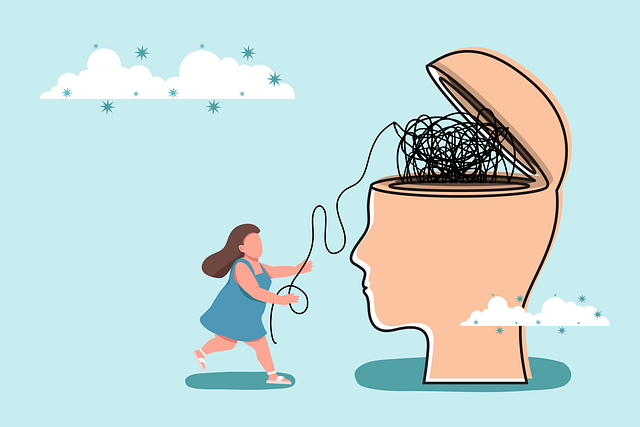Lafayette American Sign Language (ASL) Therapy offers a holistic approach to depression prevention within the Deaf community, focusing on tailored dietary and exercise routines, balanced sleep, conflict resolution skills, mindfulness practices, and supportive networks. They provide mental wellness coaching, cultural competency training for healthcare providers, and accessible resources like podcasts and support groups. By integrating coping mechanisms such as meditation, journaling, and creative expression, Lafayette ASL Therapy empowers individuals to build resilience against stress and burnout, while advocacy ensures widespread access to these preventative methods through mental health policy analysis.
Depression prevention is a vital topic, especially within communities often overlooked, such as the Deaf population. This comprehensive guide explores strategies tailored specifically for the Deaf community, utilizing the expertise of Lafayette American Sign Language (ASL) Therapy. From recognizing early signs and symptoms through ASL communication to adopting holistic lifestyle changes, connecting with supportive networks, and mastering effective coping mechanisms, we provide accessible tools to foster mental well-being and prevent depression.
- Recognizing Depression: Early Signs and Symptoms (Focus on the importance of early detection using ASL communication methods offered by Lafayette American Sign Language Therapy)
- Lifestyle Changes for Mental Well-being: A Holistic Approach (Discuss diet, exercise, sleep habits, and stress management techniques tailored to the Deaf community)
- Connecting with Support Networks: Building a Strong Foundation (Explore the role of family, friends, support groups, and therapy in preventing depression, highlighting ASL communication strategies for effective expression and understanding)
- Effective Coping Mechanisms and Stress Management (Present various coping strategies like mindfulness, meditation, journaling, and creative outlets, ensuring accessibility through ASL Therapy's guidance)
Recognizing Depression: Early Signs and Symptoms (Focus on the importance of early detection using ASL communication methods offered by Lafayette American Sign Language Therapy)

Recognizing depression early is a vital step in its prevention and effective treatment. The subtle signs and symptoms can often go unnoticed, but with increased awareness, individuals may catch them in time to seek help. Lafayette American Sign Language (ASL) Therapy offers a unique approach to identifying emotional distress, especially for deaf or hard-of-hearing communities. Through their specialized communication methods, they facilitate open dialogues, enabling individuals to express their feelings and concerns more freely.
The early detection process involves recognizing changes in mood, energy levels, interest in activities once enjoyed, and difficulties with concentration or memory. Lafayette ASL Therapy encourages those experiencing these symptoms to reach out for support. With proper intervention and the development of mental wellness coaching programs, along with cultural competency training for healthcare providers, individuals can learn emotional regulation strategies to prevent depression from escalating.
Lifestyle Changes for Mental Well-being: A Holistic Approach (Discuss diet, exercise, sleep habits, and stress management techniques tailored to the Deaf community)

Depression prevention strategies for the Deaf community require a holistic approach that considers unique lifestyle factors. Diet plays a crucial role; incorporating nutrient-rich foods and ensuring adequate intake of vitamins and minerals can positively impact mental health. Given the cultural and sensory aspects, tailored dietary plans can be developed to suit individual preferences, promoting better nutrition and overall well-being.
Exercise and sleep habits are also essential components. Encouraging regular physical activity, such as adapted sign language classes or sports tailored to the Deaf community, can reduce stress and improve mood. Similarly, establishing consistent sleep routines, considering the unique circadian rhythms of individuals, is vital for managing depression. Stress management techniques, including conflict resolution skills taught through Lafayette American Sign Language Therapy, can empower individuals to navigate challenging situations effectively. Additional stress reduction methods, such as mindfulness practices and sensory-based activities, have been shown to be beneficial in promoting mental resilience within the Deaf community.
Connecting with Support Networks: Building a Strong Foundation (Explore the role of family, friends, support groups, and therapy in preventing depression, highlighting ASL communication strategies for effective expression and understanding)

Connecting with support networks is a cornerstone in preventing depression and fostering mental wellness. Family and friends play a vital role by offering unwavering emotional support and understanding. Open communication, especially through effective ASL (Lafayette American Sign Language Therapy) strategies, enables individuals to express their feelings honestly, breaking down barriers often associated with seeking help. Support groups provide a sense of community, where individuals can share experiences and learn from one another, reducing feelings of isolation.
Therapy, either individually or through Mental Wellness Coaching Programs Development, offers professional guidance tailored to each person’s unique needs. Community Outreach Program Implementation initiatives can connect individuals with these resources, ensuring everyone has access to the support they need. Additionally, engaging in a Mental Wellness Podcast Series Production allows people to learn and share strategies for managing depression in an accessible format. These interconnected support systems create a robust foundation for maintaining and enhancing mental wellness.
Effective Coping Mechanisms and Stress Management (Present various coping strategies like mindfulness, meditation, journaling, and creative outlets, ensuring accessibility through ASL Therapy's guidance)

Depression can be mitigated through effective coping mechanisms and stress management techniques. According to Lafayette American Sign Language Therapy (ASL), various strategies like mindfulness, meditation, journaling, and creative outlets have proven beneficial in combating mental health challenges. Mindfulness encourages individuals to focus on the present moment, reducing anxiety and fostering calmness. Meditation involves quieting the mind to achieve a state of clarity and inner peace. Journaling allows for emotional expression and reflection, helping to process difficult feelings. Creative outlets such as art, music, or writing can provide an avenue for self-expression and a sense of accomplishment.
Lafayette ASL Therapy guides individuals in integrating these coping strategies into their daily lives. By developing inner strength through these practices, one can enhance resilience against stress and potential burnout, particularly among healthcare providers who are at high risk due to Burnout Prevention Strategies for Healthcare Providers. Mental Health Policy Analysis and Advocacy also play a crucial role in ensuring accessible and effective prevention methods like those offered by Lafayette ASL Therapy.
In conclusion, depression prevention is a multifaceted endeavor tailored to individual needs. Early detection through recognizing subtle signs, coupled with holistic lifestyle changes accessible to the Deaf community, forms a strong foundation. Leveraging support networks and adopting effective coping mechanisms, all facilitated by Lafayette American Sign Language Therapy’s expert guidance, empowers individuals to navigate life’s challenges resiliently. By integrating these strategies into daily routines, we foster mental well-being and ensure a brighter, more hopeful future.














